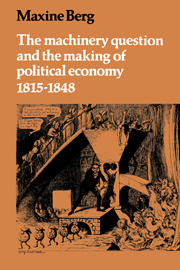Book contents
- Frontmatter
- Contents
- List of Illustrations
- Preface
- Introduction
- PART ONE THE MACHINERY QUESTION
- PART TWO THE POLITICAL ECONOMY OF MACHINERY
- PART THREE A SCIENCE OF MACHINERY
- 7 The scientific movement
- 8 The order of the factory
- PART FOUR THE POLITICS OF MACHINERY
- PART FIVE THE SOCIAL CRITICS OF MACHINERY
- EPILOGUE: BEYOND MACHINERY
- Bibliography
- Index
8 - The order of the factory
Published online by Cambridge University Press: 29 January 2010
- Frontmatter
- Contents
- List of Illustrations
- Preface
- Introduction
- PART ONE THE MACHINERY QUESTION
- PART TWO THE POLITICAL ECONOMY OF MACHINERY
- PART THREE A SCIENCE OF MACHINERY
- 7 The scientific movement
- 8 The order of the factory
- PART FOUR THE POLITICS OF MACHINERY
- PART FIVE THE SOCIAL CRITICS OF MACHINERY
- EPILOGUE: BEYOND MACHINERY
- Bibliography
- Index
Summary
The rhetoric on the connection between technological progress and economic improvement in the Mechanics Institute Movement had an explicit economic and social meaning. It was meant to contribute to the formalisation of hierarchies in the labour movement. The skilled artisan was to be separated from unskilled common labour, and both were to be detached from the middle class. This design for creating a ‘labour aristocracy’ was complemented by efforts to contribute to the discipline of the labour force. The concern with labour hierarchies and discipline was also expressed at much more concrete levels in industrial histories and manuals. The writers of these manuals also addressed themselves to the question of the relationship between science and technology. They wrote of the use of science in the improvement of actual production processes, but they took an original approach to the issue by examining the connections between technology and the science of workshop organisation. By the 1830s there was already a large number of industrial histories and lives of inventors. The cotton industry was a popular subject; McCulloch's history of the rise and progress of the industry had reached readers of the Encyclopaedia Britannica, the Edinburgh Review, and The Scotsman. John Kennedy's commentaries on the development of cotton textiles had fuelled local pride in the readers of the Memoirs of the Manchester Literary and Philosophical Society. As early as 1835 dward Baines produced a large and definitive history of the industry. Memoirs and biographies of early industrial magnates and inventors were common in the popular mechanics' journals, encyclopaedias, and journals of the philosophical societies.
- Type
- Chapter
- Information
- Publisher: Cambridge University PressPrint publication year: 1980

